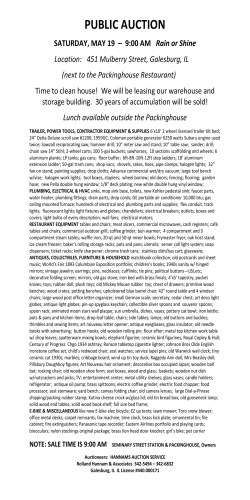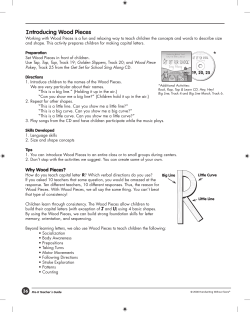
What Is a Voluntary Partnership Agreement? EFI Policy Brief 3
What Is a Voluntary Partnership Agreement? EFI Policy Brief 3 – the European Union Approach EU FLEGT Facility This Action is funded by the European Union EFI Policy Brief 3 2009 1 The Finnish Government supports the European FLEGT approach to link responsible international markets to forest protection around the world. Voluntary Partnership Agreements (VPA) may provide a novel and innovative mechanism for supporting countries that wish to manage their forests better, improve peoples’ livelihoods and protect natural resources. VPAs may also have a positive impact on partner countries’ capacities to respond to changing international market requirements for timber and carbon. Paavo Väyrynen Minister for Foreign Trade and Development, Finland 2 Introduction Illegal logging has a devastating impact on some of the world’s most valuable remaining forests and the people that live in them and rely on the resources they provide. Its environmental effects include deforestation, the loss of biodiversity and the emission of green house gases. The European Commission published the Forest Law Enforcement, Governance and Trade (FLEGT) Action Plan in 2003, setting out a range of measures available to the European Union and its Member States to tackle illegal logging in the world’s forests. The scope of the Action Plan is covered in EFI Policy Brief 2.1 This document looks in detail at one of the measures – FLEGT Voluntary Partnership Agreements. Voluntary partnership agreements are bilateral agreements between the European Union (EU) and tropical wood exporting countries, which aim to improve forest governance and guarantee that the wood imported into the EU is from legal sources. 1 http://www.efi.int/files/attachments/publications/efi_policy_brief_2_eng_net.pdf 3 David Young, Global Witness Andreas Knoell Reliable marking and recording of logs is a vital component of a timber tracking system and is a required module of legality assurance in FLEGT VPA countries. Marking using paint and/ or a marking hammer is the most common method used in the forestry sector. Besides this technique recently developed marking methods like barcodes and Radio Frequency Identification (RFID) tags are now starting to be used to identify logs and reconcile the volume of wood in national supply chains. Inspector from Harwood Timber Sdn Bhd controlling logs at a checking station in Bintulu division, Sarawak; Malaysia. Physical checks are a necessary part of any timber tracking system in order to demonstrate that the log´s specifications (e.g. volume, length, species, diameter) match the specifications recorded in the tracking database. The sampling location, method and intensity of physical checks will depend on the level of risk of misrepresentation. 4 EFI Policy Brief 3 T he EU is developing bilateral agreements with countries that export wood products to the EU, called FLEGT Voluntary Partnership Agreements (VPAs). Because they are trade agreements, the EU negotiates on behalf of all of the European Member States together. As the name suggests, these agreements are voluntary for exporting countries. However, once entered into they become legally binding on both parties, committing them to trading only in legal timber. Under these agreements exporting countries develop systems to verify the legality of their timber exports to the EU. The European Commission and EU Member States provide support to help implement such systems. Voluntary Partnership Agreements have four phases: 1. Preparation, during which countries explore the scope of the Partnership model and assess whether it meets the needs of their forest sectors; 2. Negotiation, during which the partners agree on the standards and assurance systems on which they will base their timber trade agreement; 3. Development, during which the parties develop the systems as agreed and assess their credibility; 4. Full implementation, during which the systems are functional and only licensed legal wood can be exported from the partner country to the European market. Once an agreement is fully implemented, imports from partner countries to the European Union will require a FLEGT license. Partner country imports without licenses will be prohibited. Trade in timber products from non-partner “ The VPA negotiation in Ghana has been a unique learning experience. I attribute the distinctiveness of the process to three ground-breaking factors combined: the need to bring together key sector stakeholders to achieve a common purpose within a defined time limit; the need to align national governance aspirations with international market requirements; and a keen international audience impacting on the national debate throughout. The challenge now, among others, is to build on this dynamic experience, and harness the new learning to inform future policy initiatives that relate to people, resource governance, markets and international standard-setting. Chris Beeko Ghana Forestry Commission, Ghana 1 . P r ep a r a t i o n Informal dialogue, provision of information on FLEGT aims and requirements, governance assessment, stakeholder identification Multi-stakeholder interaction (government agencies, industry, NGOs) 2 . N e g o t i at i o n Formal bilateral negotiations, concluded by a legally binding agreement on: 1. Definition of legal timber 2.Timber tracking system 3. Compliance with legality definition and application of tracking system 4.Issuing FLEGT licenses 5. Independent monitoring Negotiation partners: EU and country government. Informed and supported by a multistakeholder process. 3 . D e v e l o p m en t Implementation and independent assessment of legality assurance systems agreed in VPA Government is implementing and supported by donors. Observed and informed by stakeholders. 4 . I m p l e m en t a t i o n countries will be unaffected. In order to ensure that the agreement is enforced, each European Member State will put in place systems to stop prohibited shipments. What are VPAs trying to achieve? Timber producing countries that have entered into FLEGT partnerships see them as a way to secure and increase their access to European markets and enhance the reputation of their countries and timber products. VPAs can also support sectoral reform programmes and increase revenue collection from the timber sector. On the EU side, the partnerships are part of an explicit recognition that European consumers use significant quantities of wood products from regions where levels of illegality and poor governance in the forest sector are high. This potentially provides markets for illegal wood and profits for companies that act illegally. By ensuring that timber imports from FLEGT Partner countries are legal, the EU can create economic incentives for improving forest governance. The aim is not simply to reduce illegal deforestation, but to attempt to tackle poverty and encourage development, as forest govern- Supervised by the Joint Implementation Committee. Informed by stakeholders. ance can reduce conflict and exploitation in forest areas and create a better climate for long term investment in sustainable forest management. However, the agreements, and the transparent systems that back up national legality licenses, are not quick fixes. In many cases they may take several years to negotiate and implement. Despite this, many hope that this mechanism for combining trade and aid has the potential to be a significant step towards protecting endangered forests and fostering legal and sustainable forest management in partner countries. EFI Policy Brief 3 Full operation of the licensing scheme, exclusion of non-licensed wood from the EU 5 Jade Saunders, EFI “ With the new Lacey Act amendments, the landscape has changed for companies doing business with the U.S. Any business that wants to comply with Lacey, and avoid the risk of forfeitures, fines or even jail time, will be looking for timber sourced with careful attention to legality. Meaningful mechanisms for establishing and verifying legality, especially in high-risk regions, will be critical tools to guide decisions about timber sourcing to minimize risk. A robust VPA licensing system can offer exactly this sort of tool to companies in the partner country and their buyers. Andrea Johnson Environmental Investigation Agency, Washington DC Logs in harbour in Kribi, Cameroon, waiting to be shipped to Doula for international export. 6 EFI Policy Brief 3 Legality Assurance Systems (LAS) The credibility of each VPA relies on the development of a Legality Assurance System (LAS), the technicalities of which are detailed in the agreements. The system must be coherent and reliable, and based on the laws and institutions of the partner country. Its function is to identify and license legally-produced timber, and ensure that only this legal timber is exported to the European Union. An effective system for ensuring legality includes checks of forest operations as well as controlling the transport and processing of timber through different owners, from harvesting to point of export. Once the details of an LAS have been agreed, and a partnership agreement has been signed, the partner country will have a contracted time period to implement the necessary systems and ensure that its private sector is able to comply with its requirements. Once the systems have been implemented, only licensed timber from that country will be accepted at the EU border, and exporters of illegal timber will no longer be able to trade with the European Union. A robust LAS has five key elements: 3. A government endorsed institution to verify that laws have been complied with and the control system is being applied with sufficient rigour 1. A clear definition of legal timber What is legal wood? 2. A mechanism to control timber as it moves around the partner country Voluntary Partnership Agreements commit the EU and its partners to trade only in legal wood. 2 http://ec.europa.eu/development/policies/9interventionareas/environment/forest/flegt_briefing_notes_en.cfm 4. A licensing authority for exports 5. An independent institution to monitor the functioning of the whole system For more detailed guidance on the elements of a Legality Assurance System, see the European Commission’s FLEGT Briefing Notes.2 Jade Saunders, EFI “ Global Witness pioneered Independent Forest Monitoring (IFM) in the belief that formalised civil society involvement in checks and balances is essential to any system of governance, and welcomes Europe’s commitment to it as a key component in the FLEGT Legality Assurance Systems. The role of the independent monitor is to provide an external check on all the other components of a legality assurance system (LAS) and thus give the system public credibility. The robustness of the monitoring will rely on minimum standards of independence, access to information, and freedom to report. In the absence of these, there is a serious risk of IFM being an emblem of accountability – routinely producing reports but routinely missing the real story – which would undermine the contract a state has with its citizens and make it impossible for European consumers to have confidence in the products that are licensed under these schemes. David Young Global Witness Fishing boats carved from tree trunks in Kribi, Cameroon. In addition to contributing to export earnings, forests have an important role providing food, firewood, building materials, wood for carving and medicinal plants. The development of national legality standards for FLEGT agreements is the responsibility of the government of each partner country. However it is acknowledged that the credibility of the agreements, and their acceptability to the European market, requires that they are formulated through open and inclusive political processes. These processes are recognition of the fact that the failure to respect forest law can cause harm to different institutions and people – government, the private sector, the general public and local and indigenous communities – in different ways. A politically-legitimate standard for legality needs to involve wide consultation with all affected groups. During the process of defining legality standards, shortcomings in the existing legal frame- work may become apparent – for example gaps in legislation or over-complicated procedures. Agreements may therefore foresee reform of the national legal framework in such cases. In addition to forming the basis for FLEGT export licensing, these national legality standards may be adopted by certification bodies as one key element of sustainable forest management in partner countries. How can we know that the wood that is exported to the EU is legal? In order to ensure that the timber exported is the same timber that has been legally produced, it is necessary to have a system that can monitor the movement of wood and products from EFI Policy Brief 3 In order to achieve this, it is necessary for each party to have a clear understanding of what legal production in a partner country involves. As noted above, definitions are based on the laws and regulations of individual partner countries. However, the European Union has committed, through the FLEGT Action Plan and a number of international agreements, to sustainable forest management, so partner countries are encouraged to consider the three pillars of sustainability when establishing their national standards. Generally the areas of law included cover environmental protection, logging rules, payment of fees, timber trade and transport regulation and property rights, including those of communities who depend on forests for their livelihoods. 7 Niina Verkerk, EFI “ The national multi-stakeholder discussions leading to the timber legality standard and verification system was the first chance some Indonesian forest stakeholders have had to understand some of the many complex laws that apply to the forests here. This process has empowered civil society to be deeply involved in the design of a credible legality definition instead of feeling dictated to by government and big business. If Indonesia is going to tackle deforestation it will have to get to grips with some difficult political and economic questions – agricultural conversion, land rights – and tackling illegal logging and the trade in illegal wood is one of them. An implementation of rigorous licensing scheme, including independent auditing, transparency, and civil society monitoring, will be a genuine step towards this. If a credible VPA goes ahead we will feel like we might just have a chance at a sustainable future for Indonesian forests. 8 EFI Policy Brief 3 Checking paperwork in a factory in Indonesia. harvest to export. Many companies around the world have such systems in place for their individual operations, but FLEGT agreements commit partner countries to developing national systems which cover all domestic and international companies exporting wood to the EU. In addition, some countries are choosing to apply their systems more widely than this, for example by ensuring legal compliance in companies exporting to other markets, or also covering production for the domestic market. The systems are designed to ensure that use rights are in place and processing is undertaken in compliance with national law. Beyond this the system must check that illegal wood cannot be licensed Mardi Minangsari Telapak, Indonesia as legal later in the production process. It does this by ensuring that the amount of wood that is licensed for export is not more than the amount of wood legally harvested – measuring and reconciling the volume of wood at a number of points throughout individual company supply chains as well as throughout the national wood production process. As well as producing timber, some partners also import wood from neighbouring countries, and process it before exporting the final products to the European Union. In these cases, control systems have to be able to ensure that wood form external sources has also been legally imported. How can we be sure that the systems that underpin VPAs really work? In order for European consumers to be confident that they are not buying illegal wood, and for partner countries to be sure that their forest sector regulation is effective, each VPA includes commitments to regular auditing of legal compliance. Auditing can be done by the partner country government or an organisation that it chooses. Whoever undertakes this compliance check, it must be clear in the Agreement when and how the checking will happen and what actions need to be taken if problems are identified. As a final guarantee of integrity, an independent organisation should also have a responsibil- ity for scrutinising the whole control system, including the regular verification checks, and there must be a way of alerting the governing body of systemic or specific faults in the licensing scheme. Once a robust system is in place to identify and audit legal wood, exports can be licensed. Europe’s commitments As well as reducing its demand for potentially illegal wood, the European Commission and Member States are supporting partner countries to invest in the systems needed to manage their forest sectors in a way that brings benefits across their countries, and, in the case of reduc- Companies in Indonesia have responded to increasingly sensitive consumers in Europe, the US and Japan by joining voluntary schemes, which demonstrate the legal origin of their wood. Establishing systems to show Verified Legal Origin is seen as a first step towards certification in progressive Indonesian factories. ing global warming gas emissions from deforestation, for the whole world. In the longer term it is expected that increased revenue collection in partner countries will cover ongoing costs. The European Commission also represents the European States, in partnership with the exporting country, in monitoring – jointly with the partner country – the Development and Full Implementation phases of the agreement. Through this joint monitoring, any conflicts can be resolved and, if necessary, the agreement can be ended by either side if they feel that it is not meeting their expectations. While they are outside the scope of the bilateral agreements, as noted above, the European Commission also hopes that partner countries can use their assurance systems to ensure that exports to other countries outside Europe are legal; and that timber buyers outside the European Union can buy FLEGT-licensed timber, confident that they are not trading in illegal wood. Recognition of FLEGT-licensed timber on the European market In order to have the most impact possible, the FLEGT Action Plan takes a broad approach, incorporating a range of initiatives to bring together trade policies that are under the control of the EU, and responsible purchasing by governments and timber importers in Member States. EFI Policy Brief 3 Andy White Rights and Resources Initiative Niina Verkerk, EFI “ Recent discussions on investments in tropical forest areas have shifted sharply toward payments for reducing emissions from deforestation and degradation (REDD). There is great opportunity here, but also great risk, and we must proceed carefully, building on the lessons we’ve learned from the 50 years of efforts by developed countries to promote the conservation of developing country forests. FLEGT Voluntary Partnerships have several important characteristics that should be studied closely as we think about this new source of funding and new orientation to forest development: inclusive national standard-setting processes that tackle critical questions of land and resource rights, multi-stakeholder dialogues to advise and guide government policy, independent and transparent auditing of all funding and government decisions, and harnessing the financial incentives to drive disclosure and support credible progress over time. To be both effective and serious, international efforts to address climate change adaptation and mitigation will have to take similar steps, making clarifying and securing property rights a first priority, and expanding the discussions at the negotiating table to include all relevant stakeholders. 9 Niina Verkerk, EFI 10 EFI Policy Brief 3 The furniture industry in Indonesia is dominated by Small to Medium Sized Enterprises (SMEs). The industry employs between 250,000 and 500,000 people, but ASMINDO (Indonesia Furniture Industry and Handicraft Association) reports a much higher number as subcontracting to informal workshops is a common practice. Because VPAs are bilateral and voluntary, in October 2008 the European Commission proposed new Europe-wide legislation that would require operators placing timber products on the EU market to put in place systems to ensure that their timber is of legal origin. The proposal explicitly recognises FLEGT licensed products from partner countries as evidence of legality. Such a measure would cover a very wide range of products including furniture and paper, which have been made from imported wood in countries outside the European Union. In addition to European measures, individual Member State governments are being encour- “ In a country where voluntary credible certification is not yet mainstream, mandatory FLEGT licensing is an alternative to assure that only legal timber enters and leaves Malaysia to supply the European market. The aspiration of both governments to conclude a VPA efficiently is commendable and will be viewed positively by environmental groups provided that issues identified during the independent technical evaluation are addressed or acknowledged as conditions to the signing. To ensure the licensing is credible the Malaysian government needs to be open to including informed stakeholders from environmental and social groups into the VPA process and should not restrict them to consultation or briefing sessions only but rather invite engaged groups into relevant technical committees and to be members of the Reporting Body or Joint Implementation Committee. Ivy Wong Abdullah WWF-Malaysia aged to purchase legal and sustainable paper, construction timber, office furniture and other forest products. There are also efforts to make companies in the EU aware of their responsibility to buy legal and sustainable wood, and help them develop tools to do this easily. Given that VPAs commit the partners to trading only in licensed timber, the European Commission has also committed to encouraging recognition of FLEGT licensed timber among European importers. It is hoped that this will ensure that businesses and consumers understand that, if they wish to avoid buying illegal wood, they must pay the real cost of producing wood legally, rather than searching only for the cheapest price, which risks sacrificing social and environmental concerns. Each of these measures alone may not significantly reduce European market access for illegal timber. But collectively they form a coherent package of measures that should reinforce the impact of each, and have the potential to reduce the economic incentives for illegal deforestation and logging and trade, to help promote good governance in the forest sector and ultimately to help make forest management a more attractive investment for countries and individuals. Authors: EU FLEGT Facility Corresponding author: Jade Saunders ([email protected]) | Series editors: Ilpo Tikkanen, Risto Päivinen and Minna Korhonen ISBN: 978-952-5453-33-2 © European Forest Institute 2009 Cover photo: Niina Verkerk Printed on Munken Polar paper which is certified in accordance with the rules of the Forest Stewardship Council (FSC) – certificate number SGS-COC-1693. Disclaimer: This publication has been produced with the assistance of the European Union. The contents of this publication are the sole responsibility of the authors and can in no way be taken to reflect the views of the European Union. EFI Policy Briefs Unbiased science-based and policy-relevant information is essential for sound decision-making. EFI Policy Briefs convey current forest policy questions and challenges and outline courses of action to resolve them with the help of research. Torikatu 34, FIN-80100 Joensuu, Finland Tel. +358 10 773 4300, Fax. +358 10 773 4377 www.efi.int The European Forest Institute is the leading forest research network in Europe. It is an international organisation established by European States to conduct and advocate for forest research, and advance forest research networking across the whole of Europe. It is an acknowledged contact point for unbiased, policy-relevant information on forests and forestry.
© Copyright 2026











